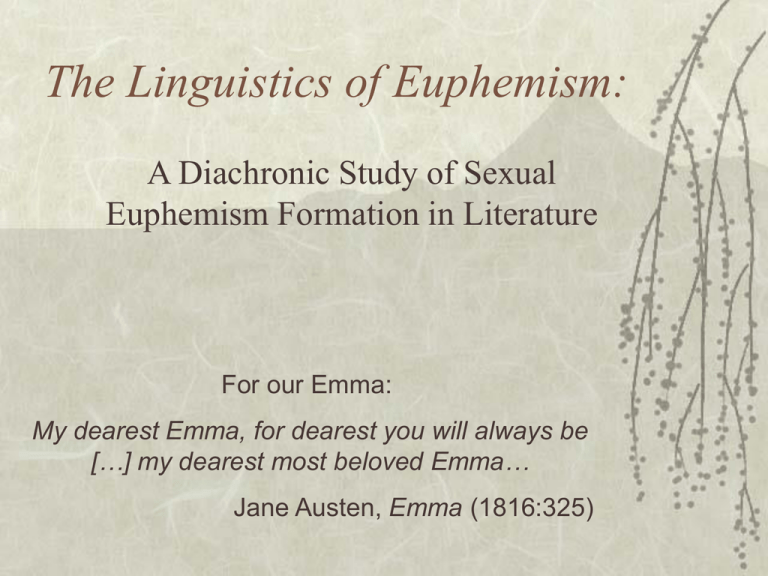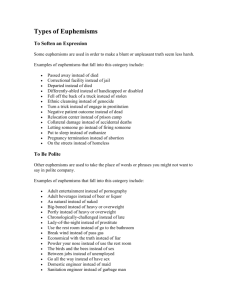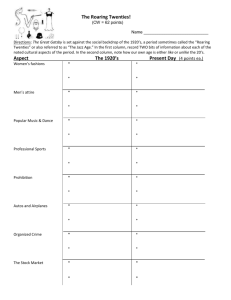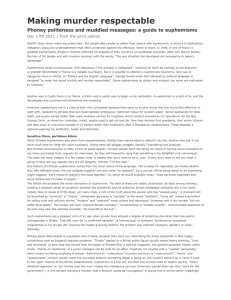
The Linguistics of Euphemism:
A Diachronic Study of Sexual
Euphemism Formation in Literature
For our Emma:
My dearest Emma, for dearest you will always be
[…] my dearest most beloved Emma…
Jane Austen, Emma (1816:325)
“In the beginning was the word.
There
followed, at an undetermined but one
assumes decent interval, private, harsh, and
dirty words. Invention here being the mother
of necessity, the need for euphemism arose.
Nowhere could this need have been greater,
or more evident, than in the realm of sex.”
Epstein, J. (1985) “Sex and euphemism,” in Enright, D. J. (Ed.) Fair of
Speech: the uses of euphemism. Oxford: Oxford University Press,
p.85.
compounding
derivation
i) Word formation
devices
blends
acronyms
onomatopoeia
back slang
Formal innovation
rhyming slang
ii) Phonemic
modification
phonemic
replacement
abbreviation
Euphemisms
iii) Loan words
particularisation
implication
(iv) Semantic innovation
metaphor
metonym
reversal
understatement
overstatement
Figure 1: Classification of the main devices for constructing euphemisms (Warren, 1992a:133)
Word Formation Devices
1) Compounding: ‘hand job’ [masturbation]
2) Derivation: ‘fellatio’ [oral sex]
3) Blends: Warren gives no examples of what she
means by this term, or of how a blend is formed.
4) Acronyms:
Fucked Up’]
SNAFU [‘Situation Normal All
5) Onomatopoeia: ‘bonk’ [sexual intercourse]
Phonemic Modification
1) Back slang: ‘enob’ [bone/erect penis], Rawson
(1981:88) and ‘epar’ [rape] (Warren, 1992:133).
2) Rhyming slang: ‘Bristols’ [breasts], a
shortened, and further euphemised, version of
‘Bristol cities’ [titties]
3) Phonemic replacement: ‘shoot’ [shit]
4) Abbreviation: ‘eff’ (as in “eff off!”) [fuck
(off)].
Loan Words
1) French: ‘mot’ [cunt]; ‘affair(e)’
[extramarital
engagement];
‘lingerie’
[underwear]
2)
Latin: ‘faeces’ [excrement]; ‘anus’
[asshole].
3) Other languages: Spanish: ‘cojones’
[testicles]; Yiddish ‘schmuck’ [penis] in
Yiddish literally means ‘pendant’
Semantic Innovation
Particularisation:
‘satisfaction’ [orgasm];
‘innocent’ [virginal]
2) Implication: ‘loose’, which implies ‘unattached’,
which leads to the interpretation [sexually
easy/available]
3) Metaphor: colourful metaphorical euphemisms
surround menstruation: ‘the cavalry has come’- a
reference to the red coats of the British cavalry;
‘red letter day’ and ‘flying the red flag’
4) Metonym: maximally general ‘it’ [sex];
contextually dependent ‘thing’ [male/female
sexual organs, etc.]
1)
Semantic Innovation, continued…
Reversal: or ‘irony’: ‘blessed’ [damned];
‘enviable disease’ [syphilis]
6) Understatement: or ‘litotes’: ‘sleep’ [die]; ‘deed’
[act of murder/rape]; ‘not very bright’
[thick/stupid]
7) Overstatement: or ‘hyperbole’: ‘fight to glory’
[death], and those falling under Rawson’s
(1981:11) “basic rule of bureaucracies: the longer
the title, the lower the rank”, e.g., ‘visual
engineer’ [window cleaner] and ‘Personal
Assistant to the Secretary (Special Activities)’
[cook] (Rawson, ibid.).
5)
The Novels
Austen, J. (1816)
Emma.
London:
Penguin Group.
Lawrence, D. H. (1928) Lady Chatterly's
Lover. London: Penguin Group.
Walker, F. (1996) Well Groomed. London:
Hodder and Stoughton.
“It is a truth universally
acknowledged that Jane
Austen’s novels are about courtship and
marriage. But it is a truth almost as
universally ignored that they are also very
much about sex.”
Chandler, A. (1975) “A pair of fine eyes: Jane
Austen’s treatment of sex”. Studies in the novel,
vol. 7/1, p. 88-103.
“What did she say? - Just what she ought, of course. A lady
always does.”
Austen (1816:326)
i) Word
formation
devices
ii) Phonemic
modification
Euphemisms
not covered by
Warren’s model
Compounding
8
Derivation
iii) Loan words
French
2
3
Latin
0
Blends
0
Other (Italian)
1
Acronyms
0
Particularisation
19
Onomatopoeia
0
Implication
20
Back slang
0
Metaphor
9
Rhyming slang
0
Metonym
2
Phonemic
replacement
0
Reversal
1
Abbreviation
0
Understatement
7
Overstatement
1
iv) Semantic
innovation
1
Table 1: The euphemisms of Emma
“I want men and women to be able to think
sex, fully, completely, honestly and cleanly
[…] if I use the taboo words, there is a
reason. We shall never free the phallic
reality from the “uplift” taint until we give it
its own phallic language, and use the obscene
words.”
D. H. Lawrence, quoted in McMaster, J. (1987) “Love:
surface and subsurface,” in Bloom, H. (Ed.) (1987)
Modern Critical Interpretations: Emma. New York:
Chelsea House Publishers, p. 52.
“[Lawrence] sets on a pedestal promiscuous intercourse, commends
sensuality almost as a virtue, and encourages and even advocates
coarseness and vulgarity of thought and language.”
Lloyd Jones, L. and Aynsley, J. (1985) Fifty Penguin Years. Harmondsworth: Penguin, p. 65.
i) Word
formation
devices
ii) Phonemic
modification
Euphemisms
not covered by
Warren’s model
Compounding
3
Derivation
iii) Loan words
French
4
11
Latin
3
Blends
0
Other (Italian)
0
Acronyms
0
Particularisation
13
Onomatopoeia
2
Implication
20
Back slang
0
Metaphor
31
Rhyming slang
0
Metonym
22
Phonemic
replacement
0
Reversal
0
Abbreviation
0
Understatement
0
Overstatement
0
iv) Semantic
innovation
3
Table 2: The euphemisms of Lady Chatterly's Lover
“In the second half of the present century [the
twentieth] attitudes towards sexual behaviour
have changed considerably. The generative
organs and their conjunctions have been
stripped of immodesty.”
Burchfield, R. (1985) “An outline history of
euphemisms in English,” in Enright, D. J. (Ed.) Fair
of Speech: the uses of euphemism. Oxford:
Oxford University Press, p. 14.
“Sexual matters are less hedged about with ‘fair-spoken’ words than they
once were.”
Burchfield, R. (1985) “An outline history of euphemisms in English,” in Enright, D. J. (Ed.)
Fair of Speech: the uses of euphemism. Oxford: Oxford University Press, p. 29.
i) Word
formation
devices
ii) Phonemic
modification
Euphemisms
not covered by
Warren’s model
Compounding
2
Derivation
iii) Loan words
French
1
3
Latin
0
Blends
0
Other (Italian)
0
Acronyms
0
Particularisation
6
Onomatopoeia
3
Implication
15
Back slang
0
Metaphor
22
Rhyming slang
0
Metonym
11
Phonemic
replacement
2
Reversal
0
Abbreviation
2
Understatement
0
Overstatement
0
iv) Semantic
innovation
3
Table 3: The euphemisms of Well Groomed
…euphemisms are society’s basic lingua non franca […] By tracing them, it is
possible to see what has been (and is) going on in our language, our minds, and
our culture.
Rawson, H. (1981) A Dictionary of Euphemisms & Other Doubletalk. New York: Crown Publishers, p. 1.
i) Word
formation
devices
ii) Phonemic
modification
Euphemisms
not covered by
Warren’s model
Compounding
13
Derivation
iii) Loan words
French
7
17
Latin
3
Blends
0
Other (Italian)
1
Acronyms
0
Particularisation
38
Onomatopoeia
5
Implication
55
Back slang
0
Metaphor
62
Rhyming slang
0
Metonym
35
Phonemic
replacement
2
Reversal
1
Abbreviation
2
Understatement
7
Overstatement
1
iv) Semantic
innovation
7
Table 4: The total number of different euphemisms from the three novels
compounding
derivation
i) Word formation
devices
blends
acronyms
onomatopoeia
back slang
Formal innovation
rhyming slang
ii) Phonemic
modification
phonemic
replacement
abbreviation
deletion
Euphemisms
iii) Loan words
particularisation
implication
(iv) Semantic innovation
metaphor
metonym
reversal
understatement
overstatement
proper nouns
Naming
geographic adjectives
Figure 2: Preliminary modified version of Warren’s original model (1992a:133)
compounding
derivation
i) Word formation
devices
acronyms
onomatopoeia
back slang
Formal innovation
rhyming slang
ii) Phonemic
modification
phonemic
replacement
abbreviation
deletion
Euphemisms
iii) Loan words
particularisation
implication
(iv) Semantic innovation
metaphor
metonym
reversal
understatement
overstatement
proper nouns
Naming
geographic adjectives
Figure 3: Final modified version of Warren’s (1992a:133) classification model
If Bob Haldeman or John Ehrlichman or even Richard Nixon had
said to me, “John, I want you to do a little crime for me. I want
you to obstruct justice,” I would have told him he was crazy and
disappeared from sight. No one thought about the Watergate
cover-up in those terms - at first, anyway. Rather it was
“containing” Watergate or keeping the defendants “on the
reservation” or coming up with the right public relations
“scenario” and the like.
John W. Dean III, a participant in the Watergate affair,
New York Times (April 6th, 1975).






